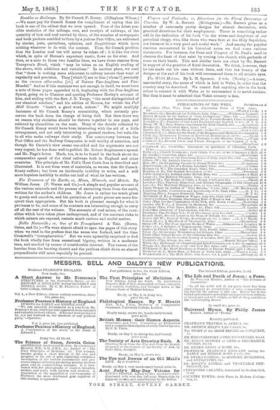Rambles on Railways. By Sir Cusack P. Roney. (Effingham Wilson.)
—We must pay Sir Cusack Roney the compliment of saying that his book is one of the oddest that we ever opened. Tons of the driest pos- sible statistics of the mileage, cost, and receipts of railways, of the quantity of iron and coal carried by them, of the number of newspapers and book packets confided to them by a jealous Post Office, are enlivened by stories, jests, quotations, opinions, and disquisitions which have nothing whatever to do with the context. Thus, Sir Cusack predicts that the London coal tax will never be taken off ; it is like the river which, in spite of Horace's expectant rustic, flows on for ever. And then, as a note to those two familiar lines, we have three stanzas from Tennyson's Brook, which "may be taken as an English reading of the above, with additions and variations." In another place, we read that "there is nothing more abhorrent to railway nature than want of regularity and precision. They [which?] are to him [whom?] precisely as the vacuum ablwrendwn [sic] of Nature Pan-Anglican and Pan- Mundal." And as if this sentence was not enough in itself, we must have a note of three pages appended to it, beginning with the Pan-Anglican Synod, going on to Chaucer and quoting Professor Morley's account of him, and ending with the Rev. J. E. Yonge, "the most distinguished of our classical scholars," and his edition of Horace, for which the Pall Mall Gazette "hasn't a good word, nohow." We might multiply instances of Sir Cusack Roney's eccentricity, which certainly pre- serves the book from the charge of being dull. Bat then there was no reason why statistics should be thrown together in one page, and relieved by absurdities on the next. Many of the details collected by Sir Cusack Roney would have been interesting with the aid of a little arrangement, and not only interesting to general readers, but valuable to all who make railways their study. Tho controversy between the Post Office and the Railway Companies is well worthy of attention, and though Sir Cusack's view seems one-sided and his arguments are not Tory cogent, he has done well to publish Mr. Robert Stephenson's speech and Mr. Page's letter. Much, too, is to be found in the book about the -comparative speed of the chief railways both in England and other countries. The principle of Mr. Fairs Mont Genie line is described and 'illustrated. It is not from want of materials, as we see, that Sir Cusack Roney suffers ; but from an intolerable inability to write, and a still more hopeless inability to strike out half of what he has written.


































 Previous page
Previous page